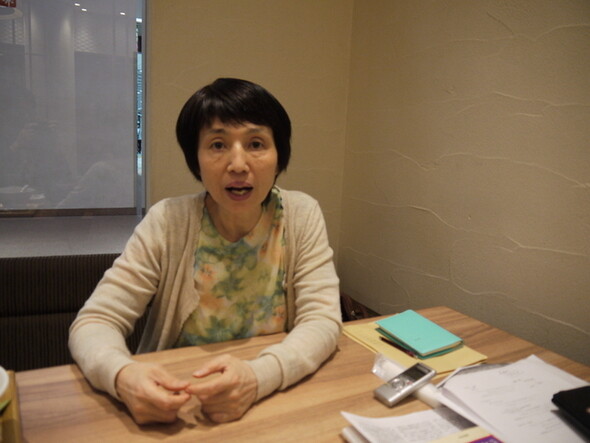hankyoreh
Links to other country sites 다른 나라 사이트 링크
[Interview] A living witness to the horrors of atomic bombs

Junko Ichiba, 60, is a living witness. Chairperson of the Association of Citizens for the Support of South Korean Atomic Bomb Victims, she has fought for more than three decades to address the issue of Koreans affected by the 1945 atomic blasts in Japan.
“Nuclear weapons have clearly caused great damage to humanity, but from the standpoint of Koreans, the greater pain was colonial rule and invasion by Japan,” she said of the current alarm in South Korea over US President Barack Obama’s upcoming visit to Hiroshima.
Hankyoreh (Hani): You’ve long been interested in the issue of Koreans affected by the atomic bombs.
Junko Ichiba: In the 1960s and 1970s, nobody in Japan was interested in the Korean atomic bomb victim issue. I went to Kyoto in 1975 when I entered university, and it was there where I first learned that Japan had colonized Korea and that Koreans [a category including all people originating from the Korean Peninsula] made up around 10% of the victims in the atomic blasts. I joined the Citizens’ Association in 1979.
Hani: What was the situation like back then for Korean A-bomb victims?
Ichiba: Most of them were living harsh lives in shanty towns. There were children huddled up under blankets because they couldn’t light coal briquettes. We would visit to give them small gifts of money to help out, and they wept [with gratitude] when they got them. The victims had a lot of resentment toward Japan.
Hani: What are your thoughts on President Obama’s visit?
Ichiba: There are some people in Japan who say President Obama should apologize for [the US] having dropped the atomic bombs, but the bigger groups like Hidankyo [the Japan Confederation of A- and H-Bomb Sufferers Organizations, Japan’s largest group for atomic bomb victims] aren‘t talking about apologies or compensation. Japanese people didn’t demand that the Emperor take responsibility for starting the war. The people who did bad things never once apologized to the public; there was no apology for the invasions of China or the Korean Peninsula. If you‘re going to demand an apology from the US, then it logically follows that you would also hold Japan accountable. So I think there’s a structure in place that doesn‘t allow [the demand for a public apology from Washington].
Hani: How does Hiroshima see the current situation?
Ichiba: In Hiroshima, the effects of the atomic bomb are an unqualified issue. Japan may have invaded [other countries], but it was Hiroshima that the atomic bomb fell on, so nuclear power is considered an absolute evil and nuclear weapons are seen as bad. But from the standpoint of Koreans, what’s more painful and a greater evil than the atomic bomb is being invaded and losing their names, seeing their lives at home destroyed and losing their land and being forcibly taken away. Consider why the atomic bombs were dropped: it was because Japan started a war of invasion, and the US dropped them first because it wanted nuclear hegemony in the Cold War. So when Japanese atomic bomb survivors talk about how “everything disappeared after that day,” nuclear weapons become an absolute evil, and they fail to think of the fact that Japan started a war of invasion that caused suffering to many Asians.
Hani: The Citizens’ Association has demanded that President Obama apologize to the Korean atomic bomb victims.
Ichiba: The statement was sent to President Obama on May 19. We’d been contacted before that by the association in South Korea. They said that if Hidankyo was demanding an apology and compensation, then the South Korean association wanted to submit it with them. I asked one of the high-ranking officials in Hidankyo, and they said there wasn’t any plan to do that yet.
By Gil Yun-hyung, Tokyo correspondent
Please direct questions or comments to [english@hani.co.kr]

Editorial・opinion
![[Column] Welcome to the president’s pity party [Column] Welcome to the president’s pity party](https://flexible.img.hani.co.kr/flexible/normal/500/300/imgdb/original/2024/0515/3917157400447943.jpg) [Column] Welcome to the president’s pity party
[Column] Welcome to the president’s pity party![[Editorial] Korea must respond firmly to Japan’s attempt to usurp Line [Editorial] Korea must respond firmly to Japan’s attempt to usurp Line](https://flexible.img.hani.co.kr/flexible/normal/500/300/imgdb/original/2024/0514/2317156736305813.jpg) [Editorial] Korea must respond firmly to Japan’s attempt to usurp Line
[Editorial] Korea must respond firmly to Japan’s attempt to usurp Line- [Editorial] Transfers of prosecutors investigating Korea’s first lady send chilling message
- [Column] Will Seoul’s ties with Moscow really recover on their own?
- [Column] Samsung’s ‘lost decade’ and Lee Jae-yong’s mismatched chopsticks
- [Correspondent’s column] The real reason the US is worried about Chinese ‘overcapacity’
- [Editorial] Yoon’s gesture at communication only highlights his reluctance to change
- [Editorial] Perilous stakes of Trump’s rhetoric around US troop pullout from Korea
- [Guest essay] Preventing Korean Peninsula from becoming front line of new cold war
- [Column] The state is back — but is it in business?
Most viewed articles
- 1[Editorial] Korea must respond firmly to Japan’s attempt to usurp Line
- 2[Editorial] Transfers of prosecutors investigating Korea’s first lady send chilling message
- 3[Column] Welcome to the president’s pity party
- 4Second suspect nabbed for gruesome murder of Korean in Thailand, 1 remains at large
- 5Could Korea’s Naver lose control of Line to Japan?
- 6Major personnel shuffle reassigns prosecutors leading investigations into Korea’s first lady
- 7Naver’s union calls for action from government over possible Japanese buyout of Line
- 8Unexpected rate of AI development requires timely discussion of side effects
- 9US has always pulled troops from Korea unilaterally — is Yoon prepared for it to happen again?
- 10China gains 2 new ambassadors to Korea in form of newborn panda cubs